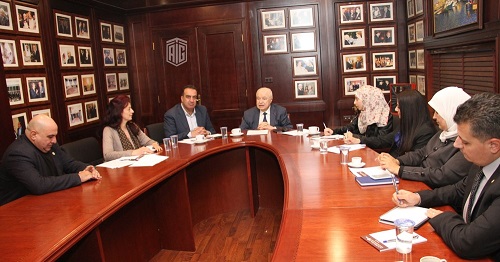03-Jun-2018
Talal Abu-Ghazaleh Forum’s 'Transformation to A Knowledge Society Committee' Recommendations
AMMAN – 'Transforming to a Knowledge Society Committee', one of Talal Abu-Ghazaleh Knowledge Forum’s committees, concluded its work by issuing its final recommendations and suggestions underlining the economic, social, technological, cultural, educational and training aspects that make up a knowledge society, which must be properly utilized in order to keep up with technological advancements.
 The report of the Committee, chaired by Mr. Ahmad Al Jaloudi, member of the 17th Lower House, underlined the causes preventing a knowledge-based society transformation, including reasons related to weak electronic linkage, lack of competent capacities, lack of research and development, as well as other reasons related to the absence of community awareness campaigns for promoting e-government services, lack of activation of the Access to Information Law, in addition to the absence of a clear national strategy for this transformation.
The report of the Committee, chaired by Mr. Ahmad Al Jaloudi, member of the 17th Lower House, underlined the causes preventing a knowledge-based society transformation, including reasons related to weak electronic linkage, lack of competent capacities, lack of research and development, as well as other reasons related to the absence of community awareness campaigns for promoting e-government services, lack of activation of the Access to Information Law, in addition to the absence of a clear national strategy for this transformation.
What is a knowledge Society?
HE Dr. Talal Abu-Ghazaleh, chair of the Forum, defined a knowledge society as "a society in which ICT constitutes what the nervous system constitutes for a human body”.
For its part, the Committee defined it as a group of individuals, institutions and governments connected through the global Internet network who share common interests and gain to benefit from each other's knowledge to develop their skills, know-how and to consequently build a society based on knowledge.
The Committee suggested a number of recommendations including the following:
• Define and make available the necessary infrastructure for resources and means of ICT and its applications and services.
• A special knowledge management department to be established by the concerned stakeholders tasked with discovering new knowledge and transferring it into a mechanism that employees and workers will be able to benefit from; this will not be achieved without addressing the infrastructure issues.
• Develop educational systems in conformity with the exigencies of the knowledge society, and create research and study centers, universities and higher institutes involved in decision making to cope with the age of knowledge in accordance with the requirements of comprehensive development.
• Provide training to students from an early age on how to use ICT and knowledge through specialized classes while introducing mechanisms to evaluate their level of performance.
• Introduce a computer curriculum at the first school years.
• Re-establish IT branch in the General Secondary Education, however, in accordance with new laws, new implementing methods and new content.
• Prepare a national training program for employees at public departments who use ICT to guide them on best practices.
• Enhance freedom of expression and the right of individuals to access information enabling people to become involved in decision-making.
• Get rid of unnecessary restrictions, traditional laws and introduce flexible legislation.
• Introduce new values and ideas in society that keep up with the spirit of the age of knowledge.
• Lead youth, by their teachers, to use social networks for the transformation into a knowledge society.
• Guide government services to digital transactions instead of paper ones to contribute to promoting knowledge concepts and their daily application, noting that there is a resistance to this change by some officials and citizens who resist the implementation of e-government to allow for wasta (nepotism).
• The necessity to enable people with special needs to be involved in the knowledge transformation process.
• Allocate the required funds to knowledge transfer and dissemination particularly generating and investing in knowledge.
• Exchange knowledge between universities, research institutes and government entities.
• Give more attention to innovation and development of new products and entrepreneurship; to turn results of scientific research into products and wealth.
• Enhance the use of Arabic language in science particularly in the field of technology and encourage Arabization of scientific content.
In addition, the Committee suggested a number of initiatives for transformation into knowledge society including:
• Launch of knowledge ambassadors program for awareness and training to motivate volunteering by ICT graduates, to be linked to the Civil Service Bureau, allowing participants in this program who are registered in the Bureau to receive preferential points that will improve their standing for recruitment. This will be in exchange for their volunteering providing awareness workshops and lectures on the usage of Internet and ICT.
• “Jordan a Knowledge Society” initiative to promote awareness of the significance of knowledge society and its positive effect on the national economy through an awareness campaign that joins together the public and private sectors, civil society institutions, schools and universities.
• To launch the knowledge Excellence Contest; which will be open to the public and private sectors to select companies for knowledge excellence awards.
• ‘Ana Menkom’ (I am one of you) initiative for the integration of people with special needs into the knowledge society based on the clear vision of Dr. Abu-Ghazaleh for the transformation into a knowledge-based society.
The Committee consists of Dr. Ali Ananzeh, Dr. Ahmad Al Sharayah, Dr. Ahmad Al Maani, Dr. Areej Yasin, Dr. Ibtisam Omish, Dr. Dina Al Hajj, Dr. Fatema Nashash, Dr. Israa Jayousi, Eng. Yousef Sarayrah, Eng. Hadil Omari and Eng. Abeer Al Zaheir.